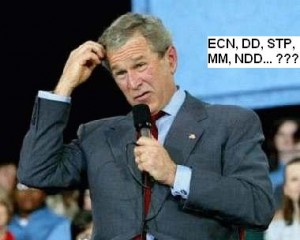
As I promised last week here goes the hopefully useful explanation about the various types of retail Forex brokers. Ever wanted to understand the difference between a DD, NDD, STP, MM, and ECN? Then this post should answer most of your questions.
First of all you need to understand that in this complex Forex world the word ‘broker’ has a double meaning. Unlike your typical equities broker like E-Trade, which only gives you an access to the market, Forex brokers often ARE the market.
Please also note that the Forex ‘market’ discussed here is much different from the typical stock market – there is no central Forex exchange, although CFTC might be working in that direction. When a Forex market is mentioned typically what is meant is access to a limited inter-banking market where several banks or other institutions display orders and deals – and there are several of these. This is also often called Liquidity pools or clearing houses.
Wikipedia:
· A broker is a party that mediates between a buyer and a seller.
· A market maker is a firm that quotes both a buy and a sell price in a financial instrument or commodity, hoping to make a profit on the bid/offer spread, or turn.
What that basically means is that a Forex broker can be either a broker per-se (just a channel between you and the actual market) or a market maker (the one who buys from you and sells to you) or even both! Confused? Let me explain this further.
Forex Market Maker (MM) is a firm that both buys from your lots and sells to you. This is also called a Dealing Desk (DD) firm.
Your orders are never quoted on the market, simply because the Broker IS the market. When you read about brokers ‘trading against you’ this is what people actually mean, although they are partly wrong – brokers don’t necessarily ‘trade against you’, they are simply the counterparty to your trades. Of course they have an obvious interest for you to lose money but when people go out and point at brokers saying they steal your money or trade against you most of the time this only serves for marketing purposes and as a promotion for other ‘non market making’ brokers.
Market Makers also typically never re-quote orders because they don’t need to route your orders to the inter-banking market but choose whether to accept your orders or not. For instance when too many traders place orders on one currency pair and in the same direction long or short, the market maker might not want to take all this risk and can reject some orders. The same can happen when there is ‘news time’ and MM’s exposure peaks beyond certain predefined levels.
You can be certain that brokers regulated by the NFA and the FSA, even if they are rumored to be market makers, are NOT trading against you as some unregulated brokers might do and with the increased focus on transparency most other brokers, even if unregulated, won’t play dirty tricks either.
Tomorrow I’ll cover the STP and ECN brokers.














